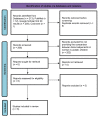Adiponectin blood levels and autism spectrum disorders: a systematic review
- PMID: 38297246
- PMCID: PMC10832114
- DOI: 10.1186/s12888-024-05529-1
Adiponectin blood levels and autism spectrum disorders: a systematic review
Abstract
Objective: To review the relationship between adiponectin levels and autism spectrum disorders (ASDs) in children.
Background: ASDs are associated with pervasive social interaction and communication abnormalities. Researchers have studied various pathophysiological mechanisms underlying ASDs to identify predictors for an early diagnosis to optimize treatment outcomes. Immune dysfunction, perhaps mediated by a decrease in anti-inflammatory adipokine, adiponectin, along with changes in other adipokines, may play a central role in increasing the risk for ASDs. However, other factors, such as low maternal vitamin D levels, atherosclerosis, diabetes, obesity, cardio-metabolic diseases, preterm delivery, and oxytocin gene polymorphism may also contribute to increased risk for ASDs.
Methods: Searches on the database; PubMed, Google Scholar, and Cochrane using keywords; adiponectin, adipokines, ASD, autism, autistic disorder, included English-language studies published till September 2022. Data were extracted on mean differences between adiponectin levels in children with and without ASDs.
Results: The search yielded six studies providing data on adiponectin levels in young patients with ASDs. As can be seen from Table 1, four of the six studies were positive for an inverse correlation between ASD and adiponectin levels. In addition, two of the four positive and one negative studies found low adiponectin levels associated with and the severity of autistic symptoms. However, results from one reviewed study were insignificant.
Conclusion: Most studies reviewed yielded lower adiponectin levels in children with ASDs as well as the severity of autistic symptoms.
Keywords: Adiponectin; Autism; Disorders; Levels; Plasma; Spectrum.
© 2024. The Author(s).
Conflict of interest statement
No competing interests for all authors.
Similar articles
-
Qualitative evidence synthesis informing our understanding of people's perceptions and experiences of targeted digital communication.Cochrane Database Syst Rev. 2019 Oct 23;10(10):ED000141. doi: 10.1002/14651858.ED000141. Cochrane Database Syst Rev. 2019. PMID: 31643081 Free PMC article.
-
Pharmacological treatments in panic disorder in adults: a network meta-analysis.Cochrane Database Syst Rev. 2023 Nov 28;11(11):CD012729. doi: 10.1002/14651858.CD012729.pub3. Cochrane Database Syst Rev. 2023. PMID: 38014714 Free PMC article. Review.
-
Depressing time: Waiting, melancholia, and the psychoanalytic practice of care.In: Kirtsoglou E, Simpson B, editors. The Time of Anthropology: Studies of Contemporary Chronopolitics. Abingdon: Routledge; 2020. Chapter 5. In: Kirtsoglou E, Simpson B, editors. The Time of Anthropology: Studies of Contemporary Chronopolitics. Abingdon: Routledge; 2020. Chapter 5. PMID: 36137063 Free Books & Documents. Review.
-
Comparing narrative storytelling ability in individuals with autism and fetal alcohol spectrum disorders.Int J Lang Commun Disord. 2024 Mar-Apr;59(2):779-797. doi: 10.1111/1460-6984.12964. Epub 2023 Oct 18. Int J Lang Commun Disord. 2024. PMID: 37850612 Free PMC article.
-
"I've Spent My Whole Life Striving to Be Normal": Internalized Stigma and Perceived Impact of Diagnosis in Autistic Adults.Autism Adulthood. 2023 Dec 1;5(4):423-436. doi: 10.1089/aut.2022.0066. Epub 2023 Dec 12. Autism Adulthood. 2023. PMID: 38116050 Free PMC article.
References
-
- Pandey S, Sharma C. Perceived Burden in caregivers of children with Autism Spectrum Disorder. J Nepal Health Res Counc. 2018;16(2):184–9. - PubMed
Publication types
MeSH terms
Substances
LinkOut - more resources
Full Text Sources
Medical
Research Materials


